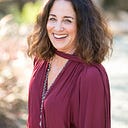Member-only story
How Suicide Turned Me Into a Seeker
“I am a humble, but an earnest seeker after truth.”
~ Gandhi
September is National Suicide Prevention Month and it’s also the month when I reminisce about my grandmother who committed suicide when I was ten years old.
It was the 1960s, and therapy was not common place. A few days after I found her after she’d taken an overdose of sleeping pills, my mother handed me a red leather Kahlil Gibran journal that had beautiful quotes at the top of each page. My mother knew that writing would help me feel better.
My mom was an English major in college and was dealing with her own grief, but as an only child who’d just lost her mother, she found it too challenging to manage my grief in addition to hers. She figured that a journal would be a good substitute, and she was right.
My journal served as a springboard for questions begging for answers, such as why my grandmother had committed suicide at the age of 61, and why my parents wouldn’t allow me to go to her funeral. Instead, they sent me to stay with my aunt and uncle.
Writing also led me to ask other meaningful questions. For days on end, I sat in my walk-in closet with clothes hanging over my head, writing in my new journal. I poured my grief onto its pages. Those writing days were also the beginning of my life as a seeker — that is, someone seeking answers to life’s mysteries.
As a seeker, I always found that writing helped me pose and answer some of life’s most important questions, such as those related to my life purpose, destiny, and how to tap into my passions. These questions inspired me to look for the messages of my heart — which came to serve as a source of growth and transformation.
I wanted to understand the reasons why certain things happened. In essence, losing my grandmother led me down a path of self-discovery. Writing also allowed me to tap into questions about my soul’s quest and my own mortality, and helped me come face-to-face with my periodic bouts of depression.
Coincidentally, my grandmother had also been a writer. Years after her passing, I found her journal, where she wrote about her tormented life as an orphan, and “an unwanted child,” during World War I, orphaned as a result of the cholera pandemic in Poland. After reading her words, I realized that we’d shared many parallel experiences and emotions, which led us both to become seekers.
